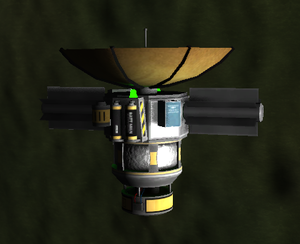Difference between revisions of "Ion-Powered Space Probe"
(+description) |
(0.25 update) |
||
| Line 6: | Line 6: | ||
This probe requires a launcher, as the ion engine doesn't provide enough thrust even to leave the ground. The [[Z-MAP Satellite]] launcher is capable of bringing this probe into orbit. | This probe requires a launcher, as the ion engine doesn't provide enough thrust even to leave the ground. The [[Z-MAP Satellite]] launcher is capable of bringing this probe into orbit. | ||
| − | Two [[PB-NUK Radioisotope Thermoelectric Generator]]s, mounted on opposite sides, are its only electric generators. They are buffered by four [[Z-100 Rechargeable Battery Pack]]s. As the generators aboard don't generate enough electricity and some is needed to run the command module, the ion engine can only run up to | + | Two [[PB-NUK Radioisotope Thermoelectric Generator]]s, mounted on opposite sides, are its only electric generators. They are buffered by four [[Z-100 Rechargeable Battery Pack]]s. As the generators aboard don't generate enough electricity and some is needed to run the command module, the ion engine can only run up to 20% of its maximum thrust. This limits the maximum force applied by the engine to about 400 N or completely dry an acceleration about 0.72 m/s². |
| − | The probe is equipped with | + | The probe is equipped with two [[sensor]]s: A [[2HOT Thermometer]] and a [[Double-C Seismic Accelerometer]]. There is enough place on the probe-body for attaching further sensors like [[GRAVMAX Negative Gravioli Detector]]s. |
== Description == | == Description == | ||
Revision as of 20:58, 14 December 2014


The Ion-Powered Space Probe is a stock probe which utilizes the PB-ION Electric Propulsion System ion engine.
This probe requires a launcher, as the ion engine doesn't provide enough thrust even to leave the ground. The Z-MAP Satellite launcher is capable of bringing this probe into orbit.
Two PB-NUK Radioisotope Thermoelectric Generators, mounted on opposite sides, are its only electric generators. They are buffered by four Z-100 Rechargeable Battery Packs. As the generators aboard don't generate enough electricity and some is needed to run the command module, the ion engine can only run up to 20% of its maximum thrust. This limits the maximum force applied by the engine to about 400 N or completely dry an acceleration about 0.72 m/s².
The probe is equipped with two sensors: A 2HOT Thermometer and a Double-C Seismic Accelerometer. There is enough place on the probe-body for attaching further sensors like GRAVMAX Negative Gravioli Detectors.
Description
| “ | This small probe may look cute and unimpressive, but once it deploys its long-range antenna, it looks pretty much the same. Its Ion engine is very efficient for a spacecraft this small, so it can go very far indeed, as long as something helps it get into orbit first, of course. — Squad |
” |